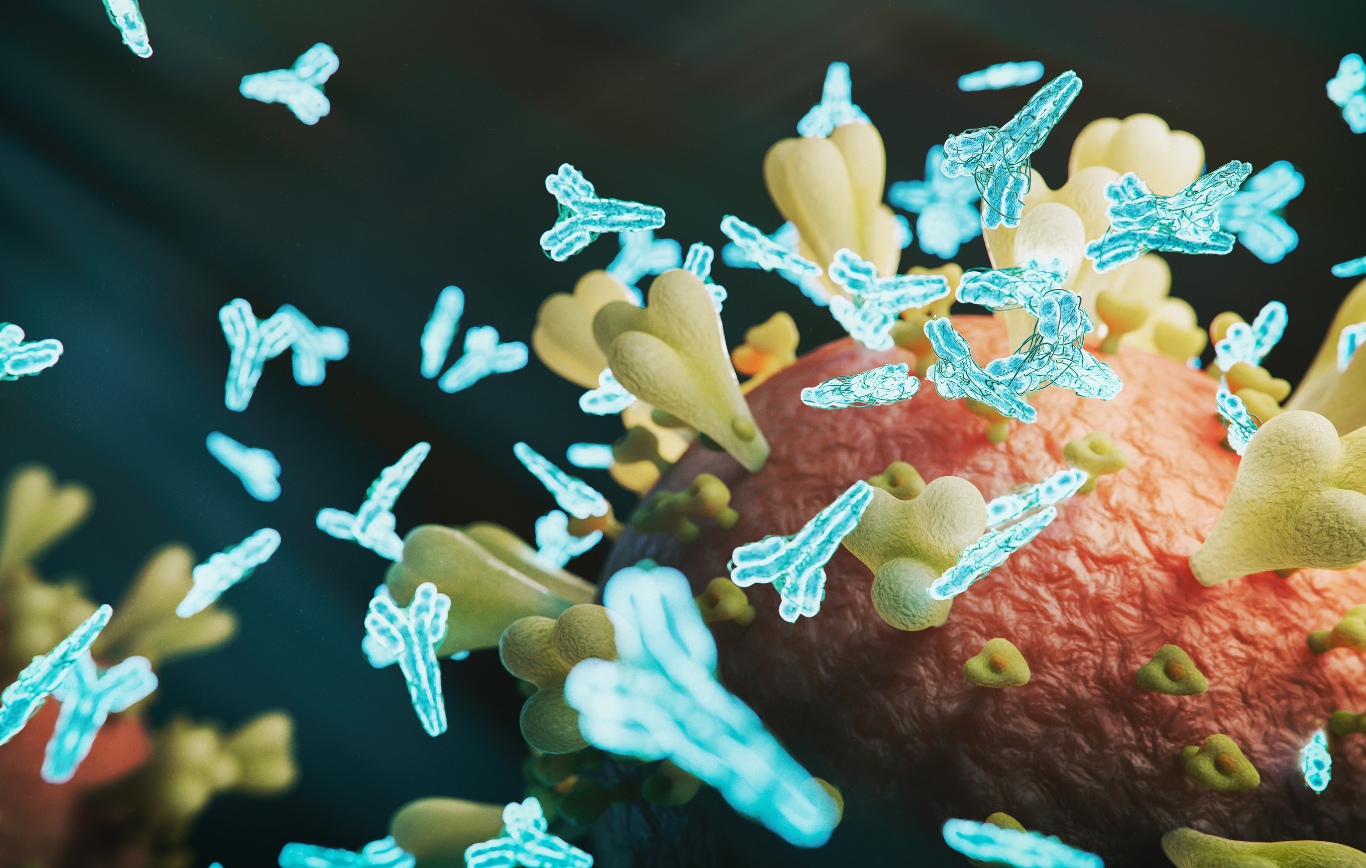Unleashing the Immune System to Fight Against Cancer
By: Heidi
Over the years, the landscape of cancer treatment has undergone constant evolution, with advancements continually reshaping the way we treat this complex disease. Traditional treatments such as surgery, chemotherapy, and radiation therapy have long been the mainstays in the fight against cancers, aiming to remove cancer cells. In recent years, the dawn of immunotherapy has heralded a new era in cancer treatment. This article provides an overview of immunotherapy, delving into some examples, current challenges, and future potentials of its use.
The Development of Immunotherapy
Imagine our immune system as a security system in your body. It’s constantly on the lookout for anything foreign or harmful, like viruses or cancer cells, and it attacks them to keep us healthy. Unlike conventional cancer treatments, such as surgery and chemotherapy, that aim to target cancer cells directly, immunotherapy targets and utilizes the power of our natural defence system – the immune system – to recognize and eliminate cancer cells.
As an innovative approach to combat cancer cells, the development of immunotherapy has been a journey marked by decades of scientific discovery and innovation. The roots of immunotherapy can be traced back to the late 19th century when researchers started to understand the role of the immune system in fighting cancer. Through coordinated responses, the immune system provides protection, promotes healing, and maintains overall health and well-being. As fields of molecular genetics and cellular biology develop, modern technologies have further propelled the development of immunotherapy forward.
In 1990, the first immunotherapy, approved by the U.S. Food and Drug Administration (FDA), was the Bacillus Calmette-Guerin cancer vaccine, for bladder cancer. As of July 31, 2023, twenty-three immunotherapies had been approved by the FDA. So far, there are five major categories of immunotherapy: immune checkpoint inhibitors, T cell therapy, monoclonal antibodies, treatment vaccines, and immune system modulators-each works by exploiting different pathways of the immune system.
Successful Examples of Immunotherapy:
Several successful examples of immunotherapy have transformed cancer management, offering new hope to patients with various types of cancer.
Chimeric Antigen Receptor T cell therapy:
Chimeric antigen receptor (CAR) T-cell therapy is a notable example of the successful use of immunotherapy. T cells are an essential component in the human immune system, playing important roles in killing harmful agents and amplifying immune system-mediated protective responses. The CAR-T cell therapy involves genetically modifying a patient’s T cells to express a cell surface protein (called a receptor) that will recognize specific surface markers on cancer cells. The genetically modified T cell can then recognize and attack cancer cells in the patient (Figure 1). Remarkable results have been observed in treating acute lymphoblastic leukaemia and non-Hodgkin lymphoma, leading to durable remissions in some patients.
Figure 1. Illustration of the development of CAR-T cell therapy in cancer patients. Created in BioRender.com.
Immune Checkpoint Inhibitor:
There are many ways to manage the immune system, including immune checkpoints and immune checkpoint inhibitors. Immune checkpoints prevent the immune system from attacking our own cells, whereas immune checkpoint inhibitors help to boost the immune response against foreign entities and cancer cells.
Sometimes, cancer cells can be sneaky. They use certain “checkpoints” to evade detection by the immune system. Immune checkpoint inhibitors work by blocking these checkpoints, essentially removing the disguise that cancer cells wear to hide from the immune system (Figure 2). This helps the immune system recognize and attack the cancer cells more effectively. A well-known immunotherapy example is the use of programmed cell death protein 1 (PD-1) and cytotoxic T-lymphocyte-associated protein 4 (CTLA-4). The treatment enhances the immune system’s ability to recognize and attack cancer cells by blocking inhibitory signals that cancer cells use to evade immune recognition. Studies have shown remarkable success in treating melanoma, lung cancer, and other types of cancer.
Figure 2. Illustration of the immune attack mediated by immune checkpoint inhibitor. Source: https://www.ucir.org/immunology-101.
Why isn’t immunotherapy the gold standard for cancer treatment?
Despite the encouraging progress we have achieved, numerous challenges arise, including the development of treatment resistance, difficulties in mitigating side effects, the lack of clinical data, and high treatment costs.
Perhaps most notably, a major challenge associated with immunotherapies is the limited capacity to predict treatment outcomes. Treatment outcomes, reflecting patients’ responsiveness, encompass both expected therapeutic effects and unexpected side effects. Some people respond poorly after treatment, whereas others show a desirable response. Significant variation in outcomes has been observed in numerous clinical trials. Multiple reasons potentially contribute to this variation, including variations in patients’ genetic profiles and differences in tumour cells within and among patients. To comprehensively understand the factors influencing treatment outcomes, further research and clinical data are necessary.
Advancing Genomic Technologies Allow Us to Overcome the Current Challenges of Immunotherapies
To further improve and optimize cancer treatment and accommodate individual genetic variations, the concept of precision medicine has seamlessly merged with cancer treatment, ushering in a burgeoning field known as precision oncology. Cutting-edge genomic technologies, such as next-generation sequencing technologies, can be integrated to revolutionize cancer management by enabling efficient diagnosis and precise prediction of treatment outcomes. By leveraging these advanced tools used in molecular genetics and immunotherapy, clinicians can tailor interventions to the unique genetic profiles of patients, harnessing the immune system’s power to target and eliminate cancer cells, thus maximizing the therapeutic efficacy while minimizing potential side effects.
Precision oncology, coupled with the advancements in immunotherapy, offers a transformative approach to deciphering the intricate interaction between the human immune system and cancer cells. By studying individual differences at the genetic level, scientists may be able to find predictive markers associated with different treatment outcomes and categorize the patient population into multiple groups. Ultimately, it is possible to provide personalized treatment to each group, based on the analysis of patients’ genetic profiles, improving treatment efficacy and limiting side effects.
Concluding Remarks
Immunotherapy has emerged as a ground-breaking approach in cancer treatment, and holds promise across a spectrum of cancer types, providing hope for long-term remission for patients. As research continues to uncover the intricate interplay between cancer cells and the immune system, combined with modern technologies, the future of cancer treatment is increasingly defined by the potential of immunotherapy to revolutionize cancer patient care. The new area of research in precision oncology has the potential to bring optimism for enhanced outcomes and a better quality of life among cancer patients.
Heidi is a graduate student in the M.H.Sc Medical Genomics program at the University of Toronto. She has been interested in precision oncology, computational biology, and clinical microbiology, and she hopes to contribute to the interdisciplinary field of genomic analysis with a specialization in pathogen genomic surveillance in the future.
References
Dobosz, P. & Dzieciątkowski, T. The Intriguing History of Cancer Immunotherapy. Front. Immunol. 10, 2965 (2019).
CPR23 – Spotlight on Immunotherapy: Pushing the Frontier of Cancer Medicine. Cancer Progress Report https://cancerprogressreport.aacr.org/progress/cpr23-contents/cpr23-spotlight-on-immunotherapy-pushing-the-frontier-of-cancer-medicine/
Rui, R., Zhou, L. & He, S. Cancer immunotherapies: advances and bottlenecks. Front. Immunol. 14, 1212476 (2023).
Chohan, K. L., Siegler, E. L. & Kenderian, S. S. CAR-T Cell Therapy: the Efficacy and Toxicity Balance. Curr Hematol Malig Rep 18, 9–18 (2023).
Tang, Q. et al. The role of PD-1/PD-L1 and application of immune-checkpoint inhibitors in human cancers. Front. Immunol. 13, 964442 (2022).
Zinn, S. et al. Advances in antibody-based therapy in oncology. Nat Cancer 4, 165–180 (2023).
Ventola, C. L. Cancer Immunotherapy, Part 3: Challenges and Future Trends. P T 42, 514–521 (2017).



